Child Labor and Global Business Practices Presentation
VerifiedAdded on 2022/09/28
|12
|1202
|39
Presentation
AI Summary
This presentation, prepared for a business course, examines the issue of child labor in the context of social sustainability and global business practices. It references a case study from 1993, focusing on clothing manufacturing and retail companies that outsource to developing nations. The presentation explores the current state of regulations and practices, highlighting the prevalence of child labor, particularly in countries like Pakistan, Mexico, and Bangladesh. It includes statistics, facts, and a CRAP test analysis of relevant references. The presentation emphasizes the need for companies to adhere to global guidelines and address the exploitation of children in the garment industry. The presentation draws on various sources to evaluate the currency, relevance, authority, and purpose of the information presented, offering a comprehensive overview of the issue and its implications for businesses operating in developing countries. The presentation also includes a discussion on the low wages and poor working conditions experienced by laborers and the role of contract labor in the garment industry.

CONTEMPORARY MANAGEMENT
NAME OF THE STUDENT
NAME OF THE UNIVERSITY
AUTHOR NOTE
NAME OF THE STUDENT
NAME OF THE UNIVERSITY
AUTHOR NOTE
Paraphrase This Document
Need a fresh take? Get an instant paraphrase of this document with our AI Paraphraser

INTRODUCTION
The case study is connected with the topic Third-world families at work: Child labor or child care?
The discussion is based on the issue which was published in the year of 1993
The topic to be discussed here includes social sustainability regulation and practice involving the business
entities mainly from the developed countries like USA or Russia
The topic is related with the organizations from clothing manufacturing and retail background, who farm
out their products to the developing nations
The presentation will be discussed on present business scenarios globally (Nichols, 1993)
The case study is connected with the topic Third-world families at work: Child labor or child care?
The discussion is based on the issue which was published in the year of 1993
The topic to be discussed here includes social sustainability regulation and practice involving the business
entities mainly from the developed countries like USA or Russia
The topic is related with the organizations from clothing manufacturing and retail background, who farm
out their products to the developing nations
The presentation will be discussed on present business scenarios globally (Nichols, 1993)

ABOUT THE TOPIC
It has been found from researches and studies that children, mainly girls, who are not more than below 10
years of age, have been working in the manufacturing units of Timothy and Thomas, an organization based
in North America, along with the women
The company breached the Global Guidelines for Business Partners, where it has been stated that child
labor was strictly banned
Most of the developing nations, for example Pakistan were not backing or supporting the rules of not
allowing to work to the children who have not crossed the age limit of 14 years
The same thing have been identified in many nations
Mexico, Sri Lanka, Bangladesh and Brazil are among those nations (Cohen & Friedman 2015)
It has been found from researches and studies that children, mainly girls, who are not more than below 10
years of age, have been working in the manufacturing units of Timothy and Thomas, an organization based
in North America, along with the women
The company breached the Global Guidelines for Business Partners, where it has been stated that child
labor was strictly banned
Most of the developing nations, for example Pakistan were not backing or supporting the rules of not
allowing to work to the children who have not crossed the age limit of 14 years
The same thing have been identified in many nations
Mexico, Sri Lanka, Bangladesh and Brazil are among those nations (Cohen & Friedman 2015)
⊘ This is a preview!⊘
Do you want full access?
Subscribe today to unlock all pages.

Trusted by 1+ million students worldwide

INFORMATION IN DETAILS
The labors engaged in these fields are mostly women and the amount received by them is very low from the
viewpoint shared by them (Van de Glind & Kou, 2013)
It has also been found that poor regulation are maintained by the suppliers in the context of labor contractors
The cost of transaction are also decreased in terms of these cases
The concept of contract labor in the export garment industry is hugely spread in different developing countries
India, Bangladesh, Turkey and Pakistan are examples of such countries (Goldin & Olivetti, 2013)
The garment industry is the primary export earner in the countries like Thailand and Bangladesh
The labors engaged in these fields are mostly women and the amount received by them is very low from the
viewpoint shared by them (Van de Glind & Kou, 2013)
It has also been found that poor regulation are maintained by the suppliers in the context of labor contractors
The cost of transaction are also decreased in terms of these cases
The concept of contract labor in the export garment industry is hugely spread in different developing countries
India, Bangladesh, Turkey and Pakistan are examples of such countries (Goldin & Olivetti, 2013)
The garment industry is the primary export earner in the countries like Thailand and Bangladesh
Paraphrase This Document
Need a fresh take? Get an instant paraphrase of this document with our AI Paraphraser

SOME FIGURES AND FACTS BASED ON THE TOPIC
It has been found that more than 400,000 children were below the age of 18 in 2007 in India
Around 168 million to 200 million child labors are present around the world in modern scenarios
1.5 to 2 million schoolchildren were forced to work in harvesting the cotton for two months every team in
Uzbekistan (Hanson,Volonakis & Al-Rozzi, 2015)
1 million children between the age of 7 and 12 are engaged to remove pests from the cotton plants every year in
Egypt
Child labor is forbidden by law in many countries around the world, but it has been practiced in many of the
nations globally (Bickford III & Rich, 2015)
It has been found that more than 400,000 children were below the age of 18 in 2007 in India
Around 168 million to 200 million child labors are present around the world in modern scenarios
1.5 to 2 million schoolchildren were forced to work in harvesting the cotton for two months every team in
Uzbekistan (Hanson,Volonakis & Al-Rozzi, 2015)
1 million children between the age of 7 and 12 are engaged to remove pests from the cotton plants every year in
Egypt
Child labor is forbidden by law in many countries around the world, but it has been practiced in many of the
nations globally (Bickford III & Rich, 2015)
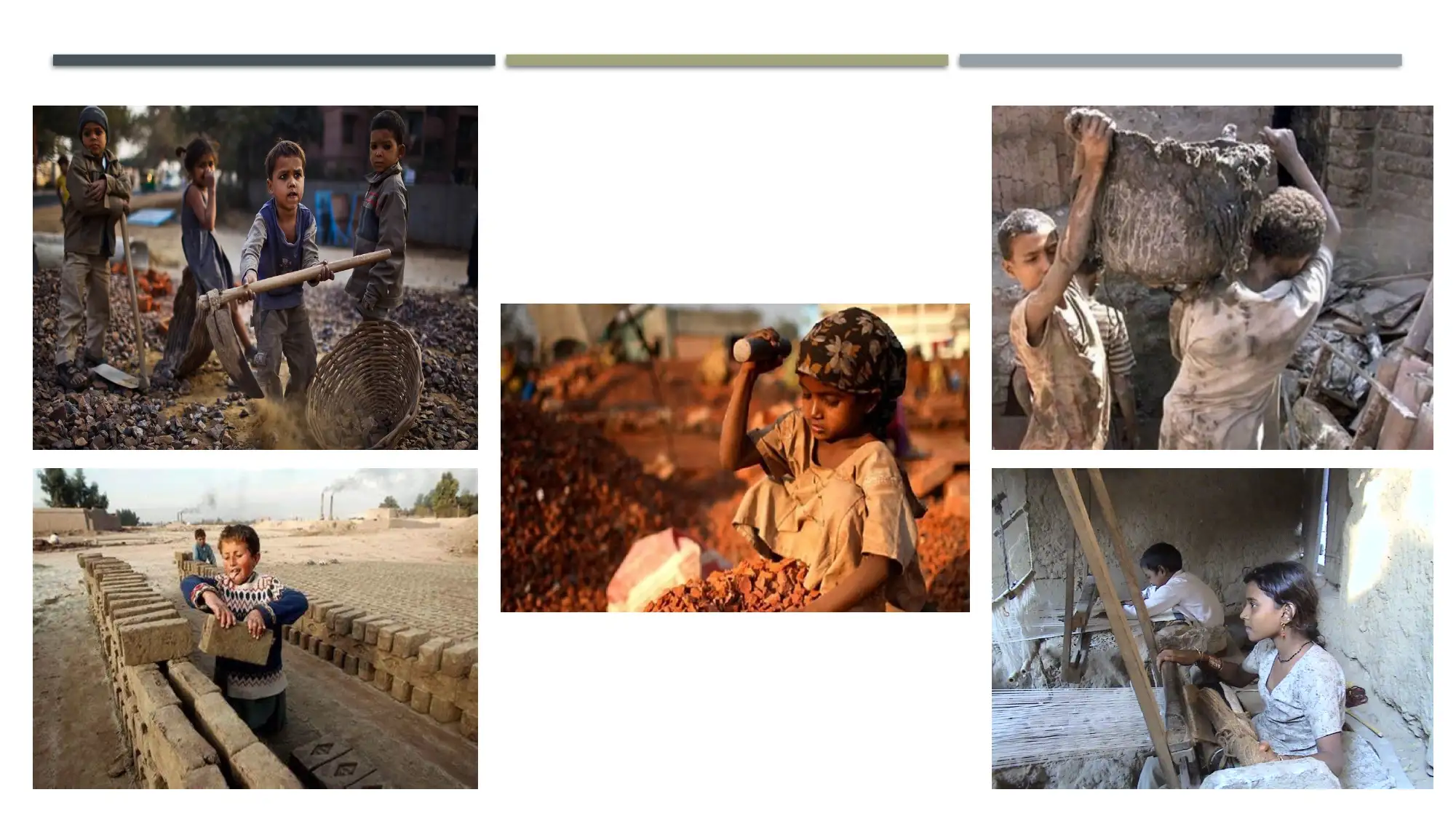
⊘ This is a preview!⊘
Do you want full access?
Subscribe today to unlock all pages.

Trusted by 1+ million students worldwide
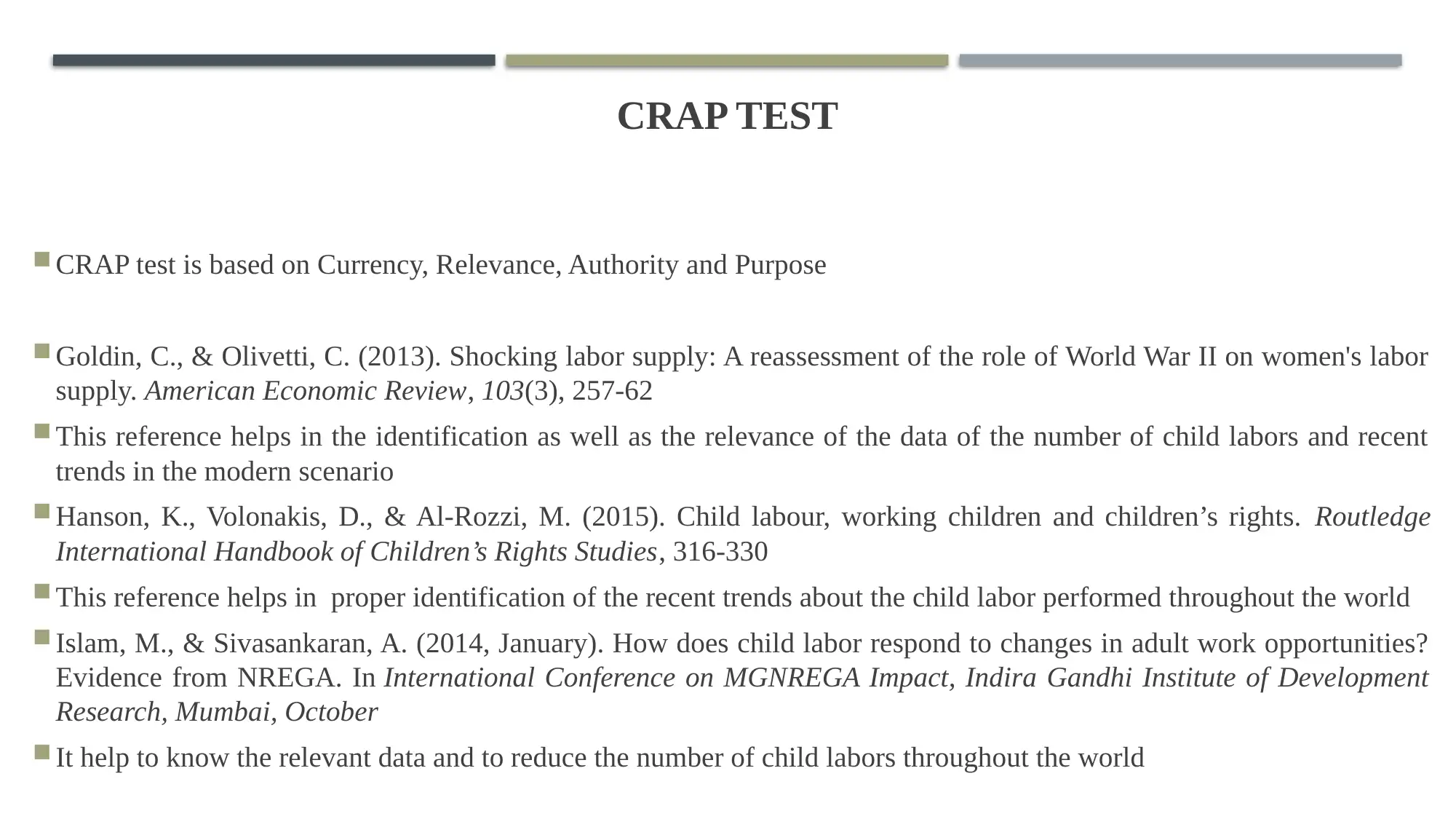
CRAP TEST
CRAP test is based on Currency, Relevance, Authority and Purpose
Goldin, C., & Olivetti, C. (2013). Shocking labor supply: A reassessment of the role of World War II on women's labor
supply. American Economic Review, 103(3), 257-62
This reference helps in the identification as well as the relevance of the data of the number of child labors and recent
trends in the modern scenario
Hanson, K., Volonakis, D., & Al-Rozzi, M. (2015). Child labour, working children and children’s rights. Routledge
International Handbook of Children’s Rights Studies, 316-330
This reference helps in proper identification of the recent trends about the child labor performed throughout the world
Islam, M., & Sivasankaran, A. (2014, January). How does child labor respond to changes in adult work opportunities?
Evidence from NREGA. In International Conference on MGNREGA Impact, Indira Gandhi Institute of Development
Research, Mumbai, October
It help to know the relevant data and to reduce the number of child labors throughout the world
CRAP test is based on Currency, Relevance, Authority and Purpose
Goldin, C., & Olivetti, C. (2013). Shocking labor supply: A reassessment of the role of World War II on women's labor
supply. American Economic Review, 103(3), 257-62
This reference helps in the identification as well as the relevance of the data of the number of child labors and recent
trends in the modern scenario
Hanson, K., Volonakis, D., & Al-Rozzi, M. (2015). Child labour, working children and children’s rights. Routledge
International Handbook of Children’s Rights Studies, 316-330
This reference helps in proper identification of the recent trends about the child labor performed throughout the world
Islam, M., & Sivasankaran, A. (2014, January). How does child labor respond to changes in adult work opportunities?
Evidence from NREGA. In International Conference on MGNREGA Impact, Indira Gandhi Institute of Development
Research, Mumbai, October
It help to know the relevant data and to reduce the number of child labors throughout the world
Paraphrase This Document
Need a fresh take? Get an instant paraphrase of this document with our AI Paraphraser

CRAP TEST EVALUATION
Sahu, K. K. (2013). An empirical study of determinants of child labour. International Journal of Science,
Environment and Technology, 2(3), 423-433.
This reference will help to identify the relevant facts and help to take necessary actions to stop the child labor
Nichols, M., 1993. Third-World Families at Work: Child Labour or Child Care?. Harvard Business
Review, 71(1), p.12
This reference will help to take necessary actions effectively and efficiently in order to stop child labour from
the developing nations
Van de Glind, H., & Kou, A. (2013). Migrant children in child labour: A vulnerable group in need of
attention. Children on the Move, 27.
Particular aspects about the characteristics of the gathered information from this reference will help in the
evaluation process as a whole
Sahu, K. K. (2013). An empirical study of determinants of child labour. International Journal of Science,
Environment and Technology, 2(3), 423-433.
This reference will help to identify the relevant facts and help to take necessary actions to stop the child labor
Nichols, M., 1993. Third-World Families at Work: Child Labour or Child Care?. Harvard Business
Review, 71(1), p.12
This reference will help to take necessary actions effectively and efficiently in order to stop child labour from
the developing nations
Van de Glind, H., & Kou, A. (2013). Migrant children in child labour: A vulnerable group in need of
attention. Children on the Move, 27.
Particular aspects about the characteristics of the gathered information from this reference will help in the
evaluation process as a whole
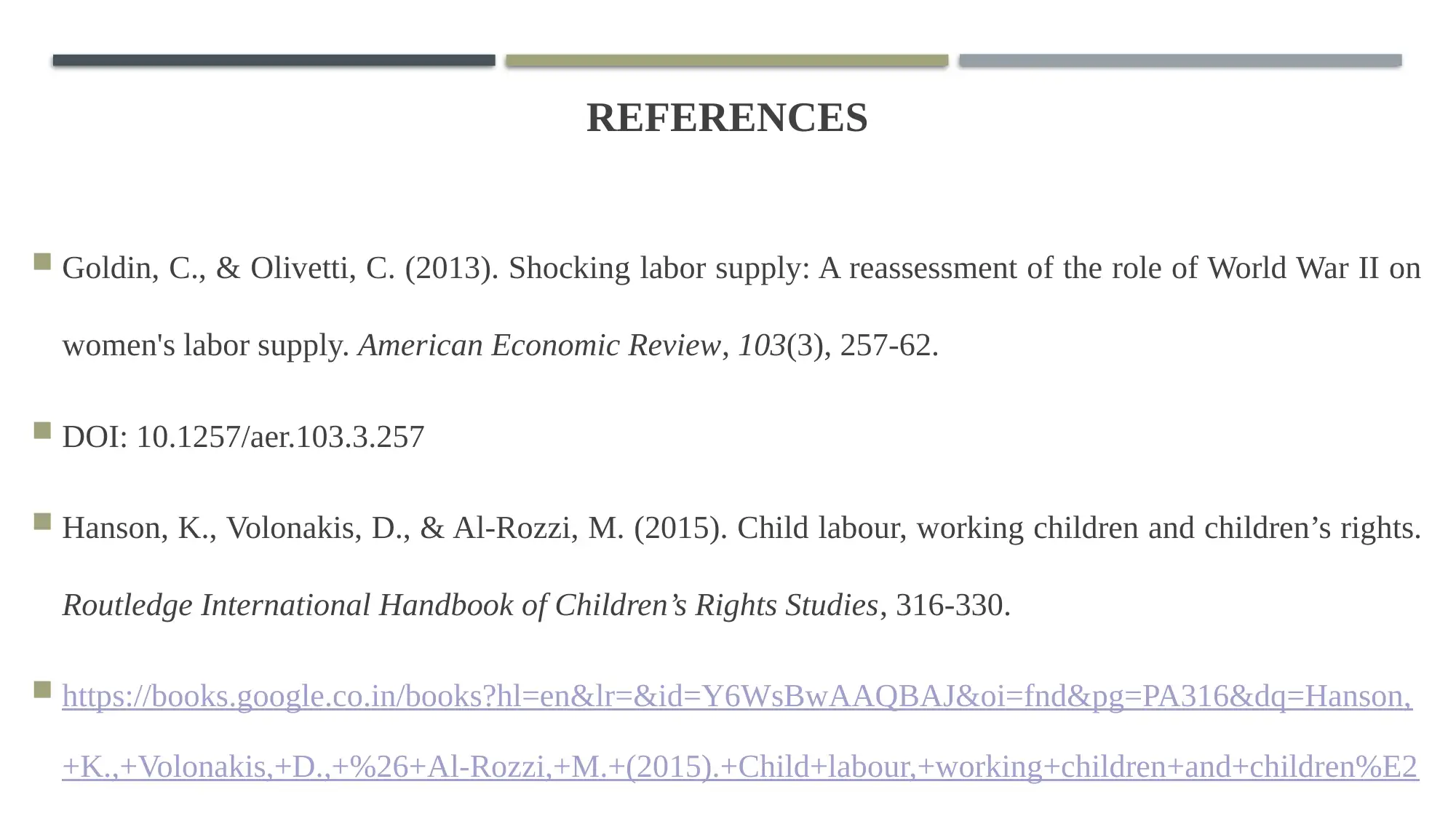
REFERENCES
Goldin, C., & Olivetti, C. (2013). Shocking labor supply: A reassessment of the role of World War II on
women's labor supply. American Economic Review, 103(3), 257-62.
DOI: 10.1257/aer.103.3.257
Hanson, K., Volonakis, D., & Al-Rozzi, M. (2015). Child labour, working children and children’s rights.
Routledge International Handbook of Children’s Rights Studies, 316-330.
https://books.google.co.in/books?hl=en&lr=&id=Y6WsBwAAQBAJ&oi=fnd&pg=PA316&dq=Hanson,
+K.,+Volonakis,+D.,+%26+Al-Rozzi,+M.+(2015).+Child+labour,+working+children+and+children%E2
Goldin, C., & Olivetti, C. (2013). Shocking labor supply: A reassessment of the role of World War II on
women's labor supply. American Economic Review, 103(3), 257-62.
DOI: 10.1257/aer.103.3.257
Hanson, K., Volonakis, D., & Al-Rozzi, M. (2015). Child labour, working children and children’s rights.
Routledge International Handbook of Children’s Rights Studies, 316-330.
https://books.google.co.in/books?hl=en&lr=&id=Y6WsBwAAQBAJ&oi=fnd&pg=PA316&dq=Hanson,
+K.,+Volonakis,+D.,+%26+Al-Rozzi,+M.+(2015).+Child+labour,+working+children+and+children%E2
⊘ This is a preview!⊘
Do you want full access?
Subscribe today to unlock all pages.

Trusted by 1+ million students worldwide
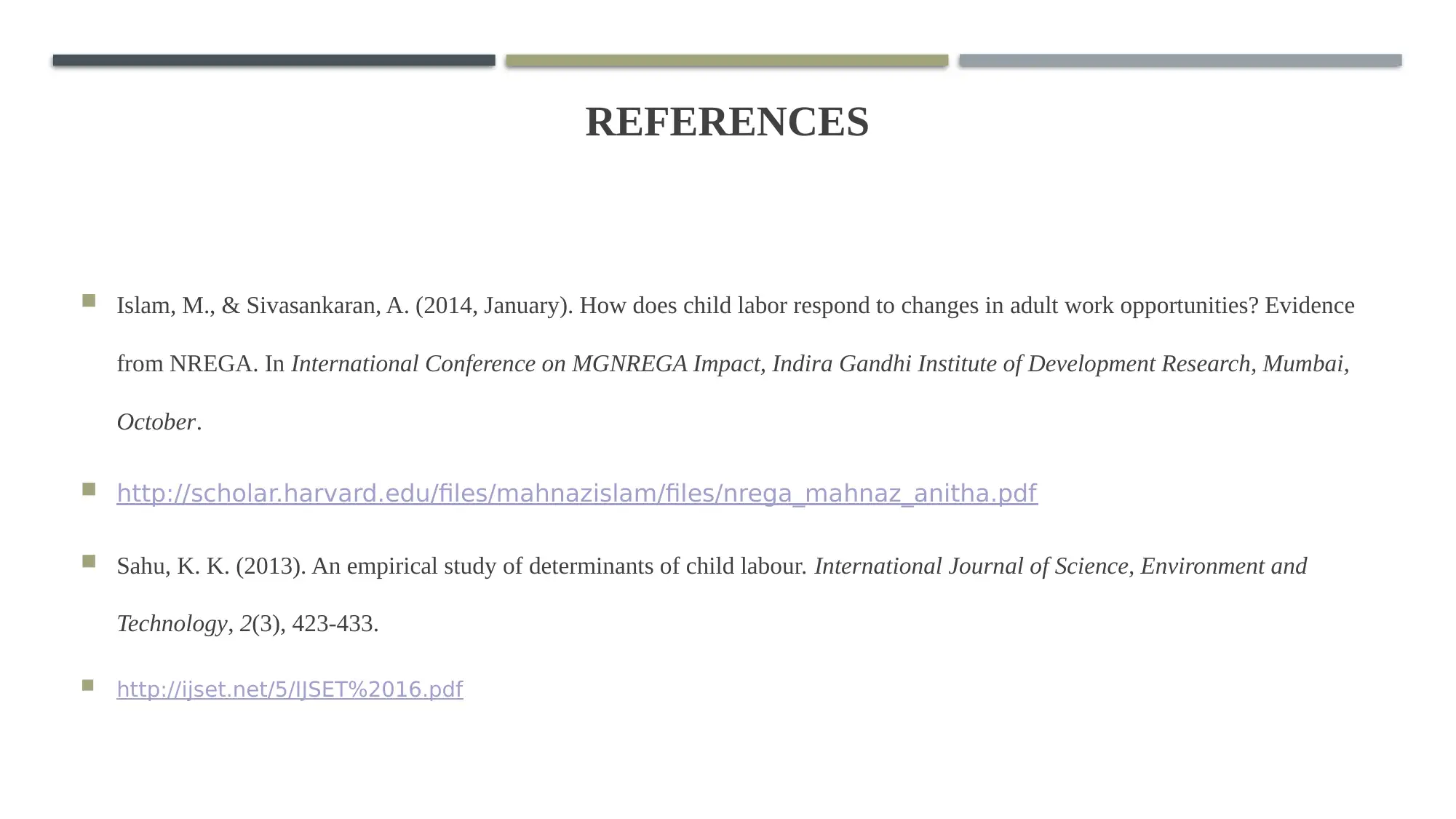
REFERENCES
Islam, M., & Sivasankaran, A. (2014, January). How does child labor respond to changes in adult work opportunities? Evidence
from NREGA. In International Conference on MGNREGA Impact, Indira Gandhi Institute of Development Research, Mumbai,
October.
http://scholar.harvard.edu/files/mahnazislam/files/nrega_mahnaz_anitha.pdf
Sahu, K. K. (2013). An empirical study of determinants of child labour. International Journal of Science, Environment and
Technology, 2(3), 423-433.
http://ijset.net/5/IJSET%2016.pdf
Islam, M., & Sivasankaran, A. (2014, January). How does child labor respond to changes in adult work opportunities? Evidence
from NREGA. In International Conference on MGNREGA Impact, Indira Gandhi Institute of Development Research, Mumbai,
October.
http://scholar.harvard.edu/files/mahnazislam/files/nrega_mahnaz_anitha.pdf
Sahu, K. K. (2013). An empirical study of determinants of child labour. International Journal of Science, Environment and
Technology, 2(3), 423-433.
http://ijset.net/5/IJSET%2016.pdf
Paraphrase This Document
Need a fresh take? Get an instant paraphrase of this document with our AI Paraphraser
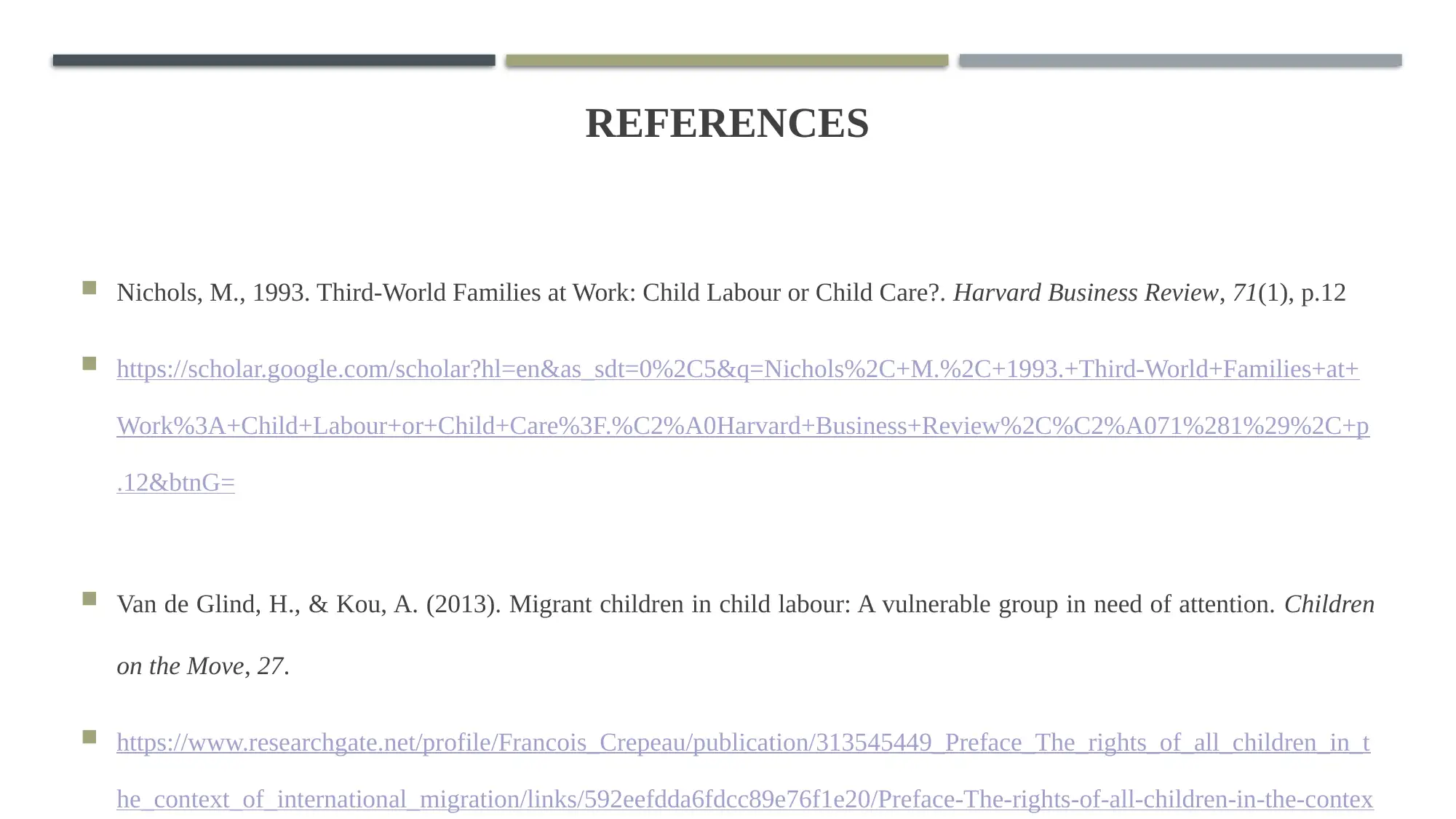
REFERENCES
Nichols, M., 1993. Third-World Families at Work: Child Labour or Child Care?. Harvard Business Review, 71(1), p.12
https://scholar.google.com/scholar?hl=en&as_sdt=0%2C5&q=Nichols%2C+M.%2C+1993.+Third-World+Families+at+
Work%3A+Child+Labour+or+Child+Care%3F.%C2%A0Harvard+Business+Review%2C%C2%A071%281%29%2C+p
.12&btnG=
Van de Glind, H., & Kou, A. (2013). Migrant children in child labour: A vulnerable group in need of attention. Children
on the Move, 27.
https://www.researchgate.net/profile/Francois_Crepeau/publication/313545449_Preface_The_rights_of_all_children_in_t
he_context_of_international_migration/links/592eefdda6fdcc89e76f1e20/Preface-The-rights-of-all-children-in-the-contex
Nichols, M., 1993. Third-World Families at Work: Child Labour or Child Care?. Harvard Business Review, 71(1), p.12
https://scholar.google.com/scholar?hl=en&as_sdt=0%2C5&q=Nichols%2C+M.%2C+1993.+Third-World+Families+at+
Work%3A+Child+Labour+or+Child+Care%3F.%C2%A0Harvard+Business+Review%2C%C2%A071%281%29%2C+p
.12&btnG=
Van de Glind, H., & Kou, A. (2013). Migrant children in child labour: A vulnerable group in need of attention. Children
on the Move, 27.
https://www.researchgate.net/profile/Francois_Crepeau/publication/313545449_Preface_The_rights_of_all_children_in_t
he_context_of_international_migration/links/592eefdda6fdcc89e76f1e20/Preface-The-rights-of-all-children-in-the-contex
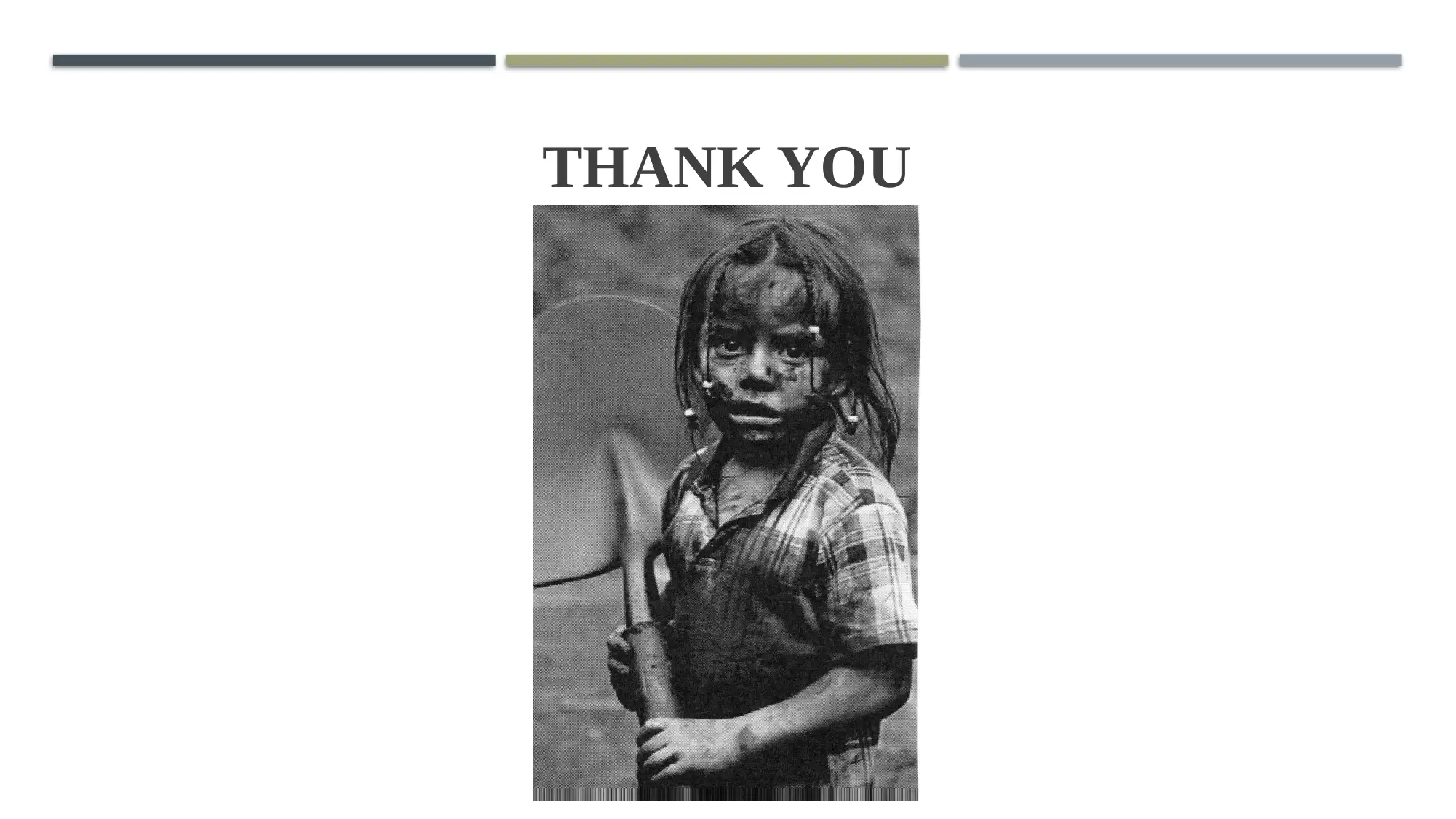
THANK YOU
⊘ This is a preview!⊘
Do you want full access?
Subscribe today to unlock all pages.

Trusted by 1+ million students worldwide
1 out of 12
Related Documents
Your All-in-One AI-Powered Toolkit for Academic Success.
+13062052269
info@desklib.com
Available 24*7 on WhatsApp / Email
![[object Object]](/_next/static/media/star-bottom.7253800d.svg)
Unlock your academic potential
Copyright © 2020–2026 A2Z Services. All Rights Reserved. Developed and managed by ZUCOL.





